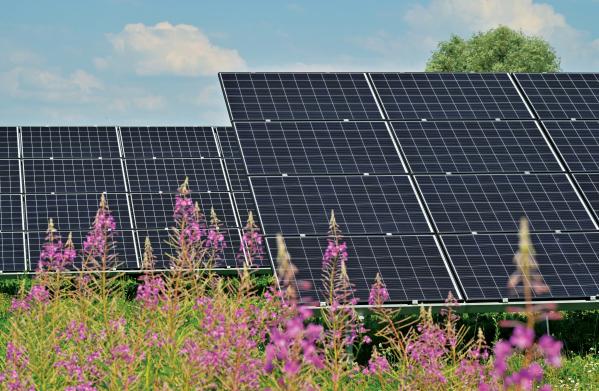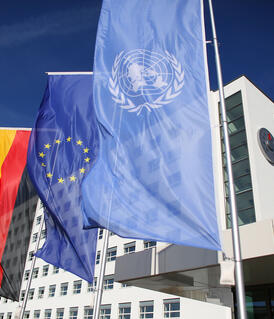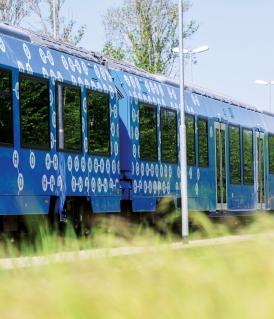Energy Transition – A Project for Generations

The energy transition is being driven forward as a high priority in Germany. The core elements are improving energy efficiency and expanding renewables as quickly as possible.
Germany is to become climate-neutral by 2045.
Instead of generating electricity from oil, coal, gas or nuclear power, in future Germany will get its power from the wind, sun, water and biomass. By 2030 at least 80% of the electricity used in Germany will be produced from renewable sources. This fundamental shift in energy supplies is a key precondition for Germany to transform itself into a climate-neutral industrial nation by 2045. An additional challenge arises from the fact that expanding renewables must cover expected increases in demand, such as from the greater use of electrical mobility.
Reducing dependencies
In response to security and economic policy Economic policy In line with the federal system, structuring and coordinating economic and financial policy is the joint task of central government, the federal states and municipalities. They cooperate in various committees. Furthermore, the Federal Government seeks the advice of independent economists. Every… Read more › concerns, Germany intends at the same time to end its dependency on oil and gas imports. The Federal Republic has few natural resources of its own, so it must import the majority of its fossil fuels from other countries.The rapid switch to renewable energy sources therefore also serves to minimise and ultimately completely remove the associated dependencies. The energy transition is the defining project for this generation, and will guarantee energy supplies that are cleaner, cheaper and safer in future.
Phasing out coal-fired electricity and nuclear power
In 2000 the then Federal Government Federal Government The Federal Government and cabinet is made up of the Federal Chancellor and the Federal Ministers. While the Chancellor holds the power to issue directives, the ministers have departmental powers, meaning that they independently run their respective ministries in the framework of those directives… Read more › made an agreement with German energy companies to phase out nuclear power.
Yes. After the disaster at the Fukushima nuclear power plant in Japan in 2011, the decision was taken to cease all nuclear power generation by the end of 2022. The last power stations went offline in 2023.
A law passed in 2020 requires that Germany phases out all coal-fired electricity generation no later than 2038.
The coal-producing regions in Germany that are affected by the change are being given assistance with the necessary structural transformation.
Setting a course early for renewable energy
Germany first began promoting regenerative energy sources in the 1990s and passed the Renewable Energies Law (EEG) in 2000. The law included what was known as the EEG levy, which distributed the increased cost of expanding environmentally friendly generation across consumers on a proportional basis. The Federal Government Federal Government The Federal Government and cabinet is made up of the Federal Chancellor and the Federal Ministers. While the Chancellor holds the power to issue directives, the ministers have departmental powers, meaning that they independently run their respective ministries in the framework of those directives… Read more › scrapped the levy in 2022 in order to reduce the burden felt by consumers due to sharp rises in the cost of energy.
More private photovoltaic installations
Thanks in part to government funding, a significant share of Germany’s electricity now comes from renewable sources. In 2024 this share was around 54 percent. The Federal Governments wants to drive this expansion further forward. In concrete terms, this means that new wind farms will be built on land, but especially offshore. Private households are being encouraged to install photovoltaic panels to contribute to their own energy supply. Digitisation is to help speed up application processes.
Expanding the electricity grid
However, the energy transition not only requires new generating facilities – a suitable electricity grid is also needed. Hundreds of kilometres of new high voltage transmission lines will need to be built, above all to carry electricity generated from wind power in northern Germany to the large industrial complexes in the south of the country.
How important is green hydrogen for the energy transition?
The use of green hydrogen (hydrogen produced using electricity from renewable sources) is considered vital to the success of the energy transition. This is particularly important to make industrial activity sustainable. For example, green hydrogen can be used in applications where electrification currently appears impractical or impossible. This includes for example the following areas.
- Steel industry
- Chemical industry
- Aviation
- Shipping
Germany's hydrogen strategy places a strong emphasis on international partnerships. This is due to the need to import large quantities of green hydrogen, which is easiest to produce in areas where there are adequate sources of renewable solar or wind energy. One way the Federal Government Federal Government The Federal Government and cabinet is made up of the Federal Chancellor and the Federal Ministers. While the Chancellor holds the power to issue directives, the ministers have departmental powers, meaning that they independently run their respective ministries in the framework of those directives… Read more › is meeting this need is by establishing strategic partnerships, such as with countries in the Middle East and North Africa (the MENA region), with South Africa and West Africa, and with Australia. At the same time Germany is promoting research and development in green hydrogen with the goal of creating modern and future-oriented climate protection technologies to become a leader on the international stage.
How is energy consumption developing in Germany?
Germany’s energy is not only to be produced more greenly, however, but also used more efficiently and sparingly. After all, as the saying goes: “the cleanest and cheapest energy is the energy you don’t even use.” Primary energy consumption has already dropped considerably: by comparison with 1990 levels, it was down by nearly 30 percent in 2024, and by 2050 is to be slashed by 50 percent.
Where can energy savings be made in particular?
There is clear potential to make savings in buildings and homes. These use around 35% of Germany’s total consumption, such as for heating and hot water. Germany is providing government funding to help members of the public renovate their homes in an energy-efficient way. Since 2000, over 5 million property owners have carried out renovation of this kind, such as replacing old heating systems or installing energy-saving windows.
What role does digitalisation play in the energy transition?
Digitisation is also helping to bring about a successful energy transition, for example through the introduction of intelligent measurement systems. Analogue electricity meters are increasingly being replaced by “smart meters”. One advantage they offer is that they display the actual amount of electricity used and when. This can make it easier for consumers to identify the best way for them to save energy.
Intelligent measurement systems also help match electricity supply and demand in the grid. For example, they can ensure that enough electricity is available as more and more people plug their electric cars in to charge at the same time during the evening and at night.


